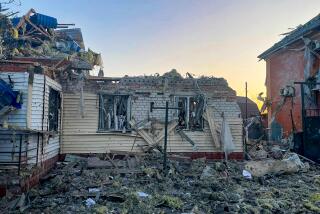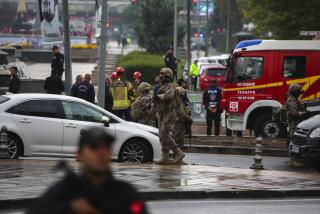Turks invade Iraq, clash with Kurds
BAGHDAD — Turkish troops clashed with Kurdish militants in the snowy mountains of northern Iraq on Friday after staging an invasion, the most serious offensive in years in Turkey’s conflict with anti-government rebels.
Iraq’s government reacted angrily, demanding the troops’ withdrawal and accusing Turkey of destroying five bridges in violation of its pledge to target only rebel bases. The White House confirmed that it knew in advance of the invasion.
The offensive could inflame ethnic tensions in what has been the most peaceful region of Iraq. Iraqi Kurds sympathize with their Turkish brethren’s quest for autonomy and want to expand Iraq’s own semiautonomous Kurdistan region. But Arabs in the north fear greater Kurdish clout will sideline them.
There were conflicting accounts on the scope of the operation, which began Thursday night. Turkish media said 10,000 troops were on the move and had gone about six miles into Iraq to pursue guerrillas from the Kurdistan Workers Party, or PKK, who use the border region to launch raids on Turkish forces. The media indicated about 60 tanks had crossed the border, but some had returned to Turkey by Friday afternoon. The operation reportedly centered on the Hakurk region south of the Turkish city of Cukurca.
Rebels said the Turkish claims were exaggerated and reported that two Turkish troops had been killed in clashes.
“We don’t think there are as many as 10,000. Probably a lot less,” said Fozdar Aresta, a rebel leader. Aresta said Thursday’s aerial bombardments had been “very heavy” and that clashes continued Friday. “We have the men and weaponry to face them,” he said.
There was no way to independently confirm either side’s claims.
Turkey’s military posted photographs on its official website showing troops clad in heavy boots trekking across a snow-covered landscape. In one photograph, a soldier propped his weapon over a giant snow mound. In another, a line of troops walked single-file along a slushy road.
Turkey’s prime minister, Recep Tayyip Erdogan, said the military “will rapidly return [to Turkey] as soon as it reaches its aim,” which he said was the elimination of PKK hide-outs.
In Washington, White House spokesman Scott Stanzel confirmed that Turkey, a NATO ally, had notified the U.S. of its plan, and he suggested that the United States had shared intelligence with Turkey before the movement.
Washington considers the PKK a terrorist organization and has said Turkey has the right to defend itself against guerrilla attacks.
The conflict, which began when PKK rebels took up arms against Turkey’s government in 1984, has put Washington in an awkward position as it juggles its alliance with Turkey with its need to keep peace in northern Iraq. Some Iraqi Kurdish political leaders have pressed the United States to intervene militarily in the situation, but it has limited its involvement to urging a diplomatic solution.
“We urged [Turkey] to work directly also with the Iraqis, including Kurdish government officials, in determining how best to address the threat of the PKK,” Stanzel said.
Tensions have been building in the region since October, when Turkey sent as many as 100,000 troops to the border to counter increased PKK raids. Since then, there have been several aerial attacks and one minor ground incursion involving about 300 troops.
The latest invasion was the biggest since U.S. forces moved into Iraq in 2003.
“It is a serious escalation, no doubt,” Iraq’s foreign minister, Hoshyar Zebari, said on Al Arabiya TV in Iraq. He said Turkish forces had destroyed five bridges, “contrary to the promises made by the Americans or other sides that the Turkish forces won’t target the infrastructure or population.”
“The situation is sensitive, delicate, and very tense,” Zebari said. “We fear some military mistakes might happen in the sites or targets and lead to unfavorable consequences for all sides.”
The Kurdistan regional government also protested the Turkish actions. “This is against international protocols, and it is a violation of international laws,” spokesman Fouad Hussein said. He warned that if Turkish troops hit civilian areas, Iraqi Kurdish forces “would answer those attacks.”
Maj. Gen. Jabbar Yawir, a Kurdistan military official, said about 2,000 Iraqi Kurdish forces had been moved to the border region “just in case of confrontations.”
Elsewhere on Friday, police in Baghdad announced an indefinite ban on animal-drawn carts after a bomb hidden inside one killed three people and injured seven in the capital’s Karada neighborhood. The cart was attached to a horse, which also died.
In the western province of Anbar, a suicide bomber killed four people in Ferris, about 15 miles south of Fallouja, U.S. officials said. The U.S. military said the bomber was waved through a checkpoint near a mosque, then walked up to two Iraqi police officers, hugged them, and detonated his explosives.
The military said three policemen and one civilian died. Iraqi police said four civilians died. There was no explanation for the discrepancy.
--
--
Times staff writer Susman reported from Baghdad and special correspondent Comert from Istanbul, Turkey. Times staff writer Tony Perry in Fallouja, special correspondent Asso Ahmed in Kurdistan, and correspondents in Baghdad and Fallouja contributed to this report.
More to Read
Sign up for Essential California
The most important California stories and recommendations in your inbox every morning.
You may occasionally receive promotional content from the Los Angeles Times.










